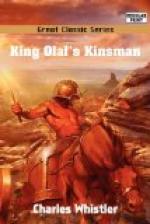At that Olaf laughed, and leaving Eadmund to his thoughts, turned to me.
“Which of the athelings are you?” he asked. “I have heard of Eadmund’s brothers,” and he held out his strong hand to take mine.
“I am but the atheling’s comrade—his servant, rather,” I said, growing red as I did so, for I had surely forgotten myself in my gladness.
“Redwald is no servant, King Olaf,” said Eadmund quickly. “He is my closest comrade here, and has fought well at my side. Thane of Bures in East Anglia he is—but now the Danes hold his place.”
“Why then,” said Olaf, “Thoralf’s grandson surely?”
“Aye, king,” I answered, wondering; “my grandfather was named Thoralf. He was one of Olaf Tryggvesson’s chiefs.”
“Then have I found a cousin,” laughed the king. “Give me your hand, kinsman,” and he looked me over from head to foot, but very kindly.
I took the king’s hand gladly, but somewhat dazed in my mind at being thus owned. And Olaf saw that I was so, and told me more.
“Asta, my good mother, was this Thoralf’s cousin, and we Norsemen do not lose count of our kin. So I knew well that Thoralf found an English home and wife when Olaf Tryggvesson was first in England, and that he was Thane of Bures by some right of his lady. So I knew, when I heard your name and place, that I had found a kinsman. And I have so few that I am glad.”
Now I knew that this was true, but we had never thought much of Thoralf, rather priding ourselves on his wife’s long descent from King Redwald. I wished for the first time now that I knew more of this Norse grandfather of mine.
“Presently we will find Rani, my foster father, who is with the ships,” said Olaf; “he knew Thoralf well. You and I must see much of one another, cousin.”
Then he turned to Eadmund, who was, as it seemed, well pleased that I had found so good a friend. And he said:
“Forgive me if I have forgotten greater matters for a moment. But I cannot greet a kinsman coldly, and it is in my mind that Redwald is a cousin worth finding, if I may judge by the way in which he hailed my news.”
“Truly,” said Eadmund, “I am minded to do as he did, now that I have taken all the wonder of it in. But it seems over good to be true—Swein dead—and your offered help!”
Then they both laughed, well content, and so Eadmund called the steward, and wine and meat were set for the king, and they sat down and talked, as he ate with a sailor’s hunger. But I listened not to their talk, my mind being over full of this good fortune of my own. I had none left of my own kin, and till today I had been as it were alone.
Presently, however, I heard an East Anglian name that was dear to me. Eadmund asked how it was that Swein Forkbeard had died, for none thought that his end was yet to be thought of as near. Now it would seem that he had gone suddenly.
“He was at Gainsborough,” said Olaf, “and he was about to make his way south to Eadmund’s burg. Whereon men say that to save his town and shrine the holy martyr, King Eadmund, whom Ingvar slew, thrust Swein through with an iron lance. Some say that he slew him otherwise, but all agree as to his slayer. And now I think that England will rise.”




